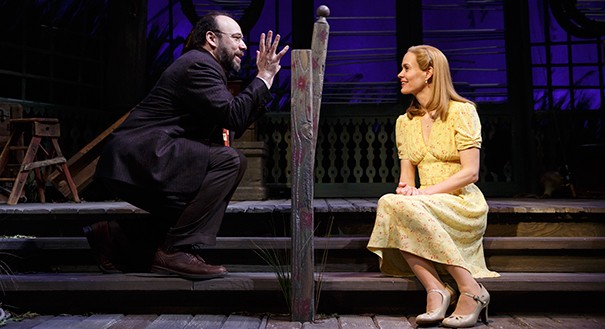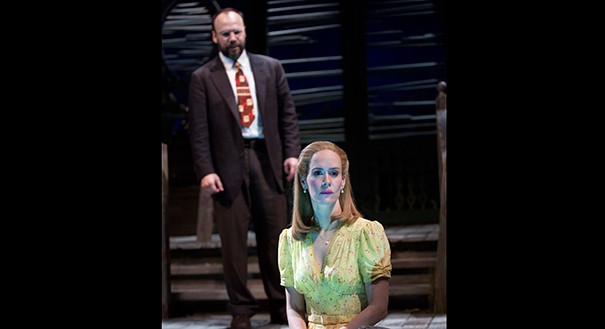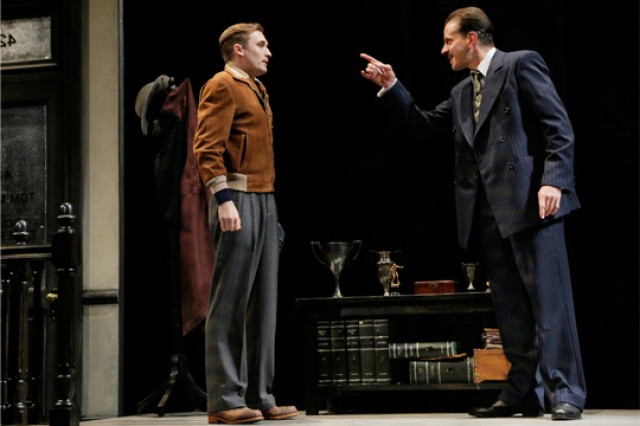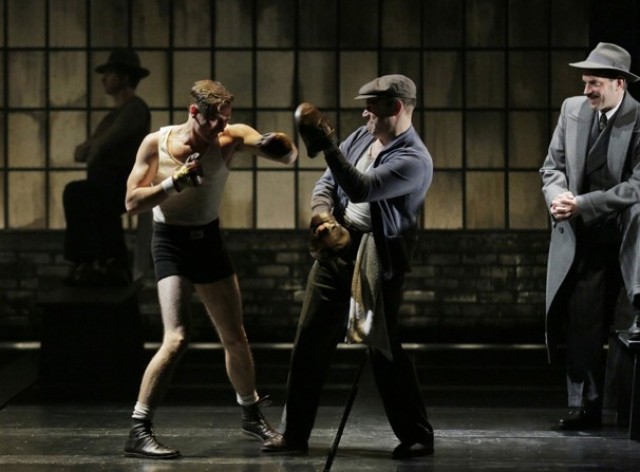
Matt Friedman (Danny Burstein) pleads his case to Sally Talley (Sarah Paulson) in new production of TALLEY’S FOLLY (photo by Joan Marcus)
Roundabout at Laura Pels Theatre
Harold and Miriam Steinberg Center for Theatre
111 West 46th St. between Sixth & Seventh Aves.
Tuesday – Sunday through May 12, $91
212-719-1300
www.roundabouttheatre.org
Danny Burstein gives one of the best performances of the season in the first-ever New York revival of Lanford Wilson’s Pulitzer Prize–winning Talley’s Folly. Burstein (Company, Golden Boy) stars as Matt Friedman, a Jewish accountant from St. Louis who has come to Lebanon, Missouri (Wilson’s hometown), in 1944 to declare his love for southern belle Sally Talley (Sarah Paulson), with whom he had a brief flirtation the previous summer. As the show starts, Friedman bursts down the aisle and onto the stage, directly addressing the audience. “If everything goes well for me tonight,” he says in a Jewish accent, “this should be a waltz, one-two-three, one-two-three; a no-holds-barred romantic story, and since I’m not a romantic type, I’m going to need the whole valentine here to help me: the woods, the willows, the vines, the moonlight, the band — there’s a band that plays tonight, over in the park. The trees, the berries, the breeze, the sounds: water and crickets, frogs, dogs, the light, the bees, working all night.” The crowd instantly on his side — he even promises that it will all take place within a brisk ninety-seven minutes — Matt is soon joined by Sally, a nurse’s aide who is helping take care of wounded soldiers at a local hospital. More than a decade younger than Matt, Sally is not thrilled to see him, begging him to leave before her anti-Semitic Ozark family does something bad to him, but Matt is not about to take off without speaking his mind — and trying to convince Sally that she feels the same way he does, which clearly won’t be easy. “You do not have the perception God gave lettuce,” she tells him. “I did not answer but one letter and in that one short note I tried to say in no uncertain terms that I didn’t want you to write to me. You have sent me an almost daily chronicle of your life in your office. The most mundane details of your accounting life. Why did you come back here?”
As he continues to woo Sally despite her protestations, Matt makes full use of designer Jeff Cowie’s dilapidated Victorian boathouse set, which has a nostalgic charm to it while also representing the changing of the Old South and the new America that will arise out of World War II. Little by little, the repressed Sally begins to open up and the captivating waltz grows ever-more complex, one-two-three, one-two-three, as it heads to its beautiful conclusion, exactly ninety-seven minutes after it started. Director Michael Wilson (Gore Vidal’s The Best Man, Enchanted April) keeps things moving at an engaging pace, with just the right balance of humor, warmth, and conflict, bringing a vibrancy and freshness to the thirty-three-year-old play, the middle part of a trilogy that began with Talley & Son and concludes with Fifth of July. Paulson (American Horror Story, Collected Stories) is excellent as Burstein’s shiksa dance partner, standing appropriately stiff and tall in her yellow dress and blonde hair, the prim-and-proper polar opposite of the dark-suited, thickly bearded, no-holds-barred Burstein, the two claiming as their own roles originated by Trish Hawkins and Judd Hirsch. This Roundabout Theatre production, immersed in a sweet, contagious innocence, is a fitting tribute to Wilson, who passed away in 2011 at the age of seventy-four, leaving behind a legacy that also includes The Hot l Baltimore and Burn This. (Wilson’s 1975 play, The Mound Builders, is currently being revived at the Signature Theatre, where it has been extended through April 14.)


